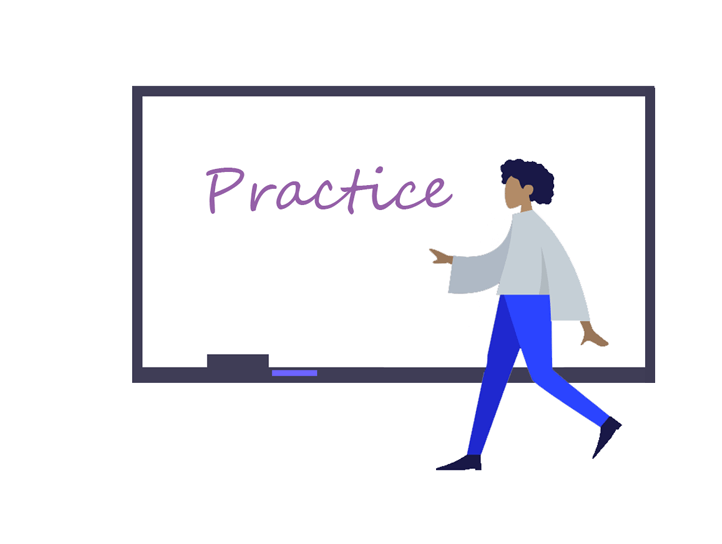“Man’s mind, once stretched by a new idea, never regains its original dimensions.”
— Oliver Wendell Holmes
Have you ever struggled to figure out what your English teacher was saying and which part of the lesson were you at? Have you ever feel so disoriented in an English listening test at school? Have you ever been lost for words when communicating with a foreigner? Every English learner has. And we know that your answer is highly likely to be a nod. It is conspicuous that regardless of your English level at present, you must have had a tough time listening to and striving for a new language. Accept it. Even if you are now advanced at English generally and listening skills particularly, you were once a beginner clueless about the language.
We all acknowledge a fact that mastering a language has never been an easy task. In order to accomplish, you are required to be proficient at four basic skills: listening, reading, speaking, and writing. It is advisable that you have a wise strategy towards each field, just like Tom Colicchio claims: “Recipes tell you nothing. Learning techniques is the key.” And that is definitely what we are going to serve you today! Now, without further ado, let’s dive right in and be ready to explore the 5 secrets to achieve your listening goal successfully.
1.Mindset
The way that you think, positively or negatively, makes a huge difference in your abilities to take action or to understand what you are hearing. If you enter the situation with a negative mindset, you might feel discouraged, insecure, and not confident, which gradually develops a fear of listening to the language. However, in the other way round, you have a positive psyche. You hold a belief, ‘I can do this. I am capable of understanding what I am hearing in English. I tried hard, and I am improving.’ These ideologies are what your mind should have before approaching a situation in English instead of the pessimistic way of thinking. Scientific researches have proven that mentality do affect the results of whatever situation it is. This is presumably the reason why coaches always demand a stable psychological state from their athletes.

So, the very first tip to become better at listening is to be confident.
“Learning never exhausts the mind.”
2.Listen, read and speak
When you listen, it is very helpful if you can use other activities to develop your listening skills. This can be compared to cross-training in sports. Let’s say you want to become a football professional. It will not be enough if you only train within your particular major. Besides trying to tackle your ball, you also need to enhance your physical strength and endurance so that you could play more effectively during the game.
For this reason, there is a high recommendation that you find materials where you could listen to and read them. For example, you could search for YouTube videos which have subtitles so that you could listen to the speaker and read the words at the same time. First, you can start with listening only. After that, combine with reading the subtitles. Then, try a method called ‘shadowing’ in which you’re going to repeat the sentences right after you hear them.
But why is this significant? Because, it obviously improves your listening skills and reading helps identify the connection between what you hear and what you read. For speaking, if you hear a sound, you will be able to listen to it more explicitly.

The second strategy: combining listening, reading and speaking skills.
“Education without application is just entertainment.”
3.Diversity
You are encouraged to listen to a diverse set of materials in terms of the lengths and the contents.
- Regarding the lengths, make your first attempt with a short video about 2-5 minutes. As you advance, expand the minutes to 20-30 minutes or even a whole movie of one or two hours.
- As for the contents, you should gain access to various kinds of material even they are not your interests. Supposed that you are in favor of the entertainment world, to illustrate, the Hollywood, you tend to watch videos about the updated news of an artist or an award. However, it also means that you only adapt to this specific aspect. You want to break out of your comfort zone, push yourself to the limits, and go into a different listening material, probably science. You can easily find videos about science on the National Public Radio or the BBC radio. There is a bunch! As a result, you can have a broader range of vocabulary on different topics and always keep things fresh.

The third advice: vary your learning resources, listening materials specifically.
“No problem can withstand the assault of sustained thinking.”
4.Guess first
What does it mean by ‘guess first’? It is to guess what you are going to hear in advance based on the situation of the material that you expect. This activates your brain, and you start thinking about the vocabulary you might encounter so that your brain does not have to work too hard to dig it up.
For instance, before doing a section in the listening task, you should read the instructions carefully and the questions, then try to guess the answer or whether it is a person or a number, etc. By this way, you can be mentally prepared.

The fourth tip: make a guess.
“Smooth seas do not make skillful sailors.”
5.Understand the big ideas
The overall point is to perceive what is special about the structure of English and the way it is spoken. What are the patterns? If you can identify the patterns of English, you can be able to place what you hear within the framework or the structure of English when you want to understand a conversation or a specific phrase. You could organize these new learnings much more easily by looking at the big picture or the general idea of how English works. More precisely, you can start by getting used to the rhythm of English, how we chunk the phrases together. Or to get accustomed to the intonation that we put on a particular part of a sentence, the stress on certain syllable of a word. One more valid point is to be familiar with the key content words and some weaker function words. By this way, you could develop a more naturally strong attachment to the English language and fully absorb what you hear.
Take intonation in a sentence as an example. If you are asking a Wh-question, like ‘What are you doing here?’, you are inclined to lower your voice. But when it comes to a ‘Yes/No’ question, you may raise it at the end of the sentence. Therefore, you can detect the kind of question the speaker is giving.

The final strategy: outlining the big pictures.
“The key to pursuing excellence is to embrace an organic, long-term learning process, and not to live in a shell of static, safe mediocrity. Usually, growth comes at the expense of previous comfort or safety.”
CONCLUSION
Above are 5 useful keys to unlock the mysteries of English listening skills that you might not want to miss! Make sure you give it a try. And once you choose to follow, stick to the tips, otherwise, it would be an absolute waste of time and effort. Do not be disheartened by obstacles or hurdles. If you could overcome this hard time, your journey to master listening skills will be much more comfortable as you already have the fundamental knowledge. ‘Practice makes perfect.’ Do not give up!
We would like to suggest some helpful listening materials that are super easy to access on the Internet.
- TED-Ed: this channel gives detailed information on almost everything in the world from arts, music to science, technology or even myths and legendaries. It is ready to welcome you into the curiosity voyage and discover incredible philosophies.
- BBC Learning English: you are going to be presented with vocabulary on the world’s’ topical events and, at the same time, staying up-to-date with the latest news on Earth.
- National Geographic: This is distinctly born for learners who are a fan of science-related fields, such as biology, geography, archaeology, and the list is still going on!
- The Ellen Show: If your interests lie in the entertainment world, you must have already known about this. A lot of non-native learners improved through this talk show hosted by a hilarious yet powerful woman. It involves interviewing almost every rising star in the Arts and Music.
- English Speeches: By listening to speeches and talks about inspiring stories, you could find yourself not only improve in listening but also in presentation skills.
It is just a shortlist of the YouTube channels that may appeal to you; however, you should seriously take them into account!
If you want to find out more secrets to listening success, check out the below video for more information!
See you in other lessons.
Goodbye, and have a nice day!





It’s a great job for beginning English learners